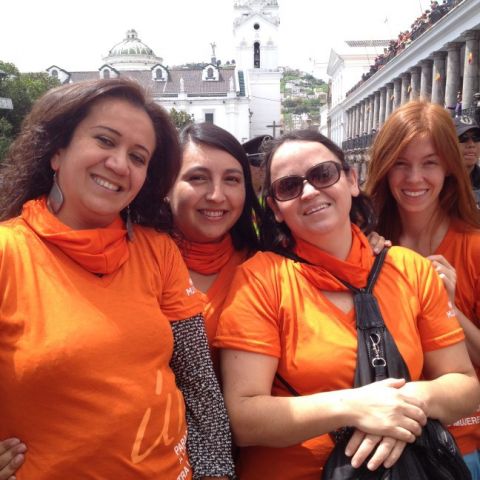
When friends and family from the States talk about Ecuador, they often mention the beauty of the Galapagos Islands and the snow-capped volcanoes of the Andes. Very few think of the prolonged armed conflict taking place in Colombia and its impact on Ecuador. Before I began my fellowship at the UN World Food Programme (WFP) last July, I also knew little about the effects of this conflict on Colombia’s smaller southern neighbor. Since 2000, approximately 175,000 people have petitioned for asylum in Ecuador, and the country currently hosts the largest refugee population in the region. WFP has been active in Ecuador since 1964 and provides emergency food aid to the Colombian refugee population and vulnerable Ecuadorian host communities.
While I had a basic understanding of the logistics of providing humanitarian assistance prior to coming to Quito, I am astonished at how much I have learned at WFP. In Ecuador WFP has taken an innovative approach to food assistance and provides beneficiaries with an electronic voucher that functions like a debit card. In order to recharge their voucher, beneficiaries participate in monthly trainings on subjects such as nutrition, safe hygiene, and gender violence prevention.
As a member of the communications team, I translate and revise publications, donor reports, and fundraising documents. I have also had the opportunity to participate in monitoring and evaluation activities, which has been my favorite experience as a PiLA fellow in Quito. To measure the impact of its food assistance, WFP staff regularly conduct surveys with beneficiaries and partner organizations. In the fall, I spent a month interviewing Colombian refugees about their eating habits and their perception of tensions between Colombians and Ecuadorians in Quito. Many would relate how they most like to prepare cassava root, or about the hardships they have encountered both in Colombia and Ecuador. Hearing their stories has been by far the most rewarding and powerful part of my time in Ecuador. This fellowship has been an unparalleled learning experience, and I am very grateful for my time with WFP.
Background: Sarah graduated from Georgetown University (2012) with a bachelor’s in Spanish and Italian.
